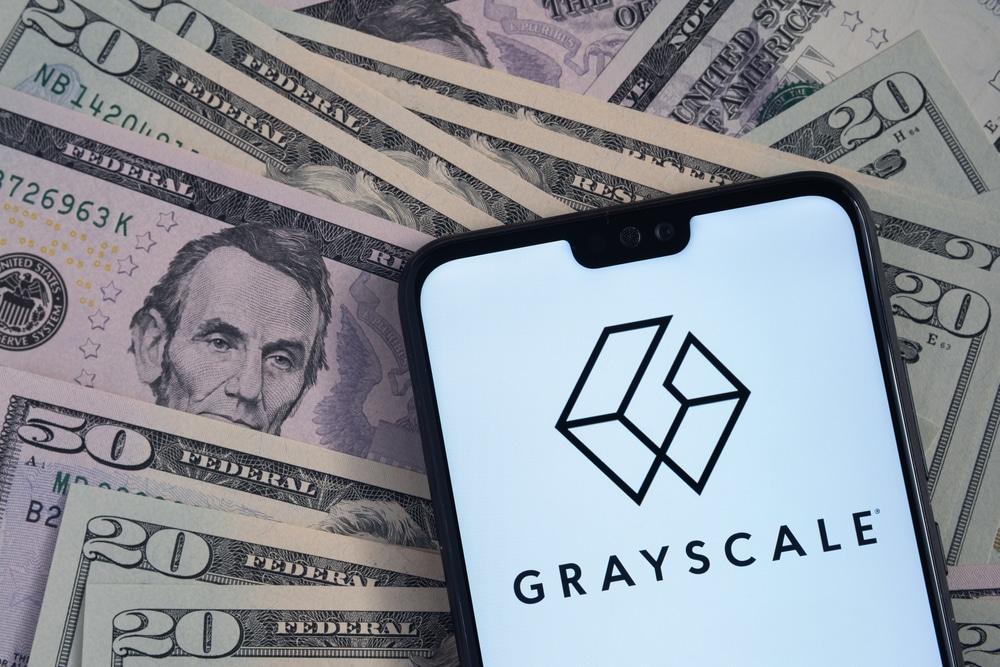The U.S. could soon witness its inaugural spot, bitcoin exchange-traded fund (ETF). Following a significant federal court decision, the U.S. SEC has been directed to reconsider its previous denial of Grayscale Investments’ proposal. Specifically, this involves transitioning the Grayscale Bitcoin Trust (GBTC) into an ETF.
Grayscale vs. SEC: The Battle Ensues
Moreover, Circuit Judge Neomi Rao provided insights into the D.C. Circuit Court of Appeals’ standpoint. Rao emphasized that the SEC recently green-lighted two bitcoin futures funds for trading on major exchanges.
However, Grayscale’s Bitcoin fund faced rejection. Significantly, Grayscale contended that its proposed bitcoin ETF mirrors the bitcoin futures ETFs in material ways. Hence, it should’ve received the nod to feature on NYSE Arca.
Rao further pointed out a critical lapse on the SEC’s part. The commission didn’t articulate why it differentiated between these products. Consequently, she labeled the Grayscale disapproval as “arbitrary and capricious.” Additionally, the ruling highlighted that the contention wasn’t about the SEC’s refusal per se. Instead, it centered on the commission’s inability to provide a coherent justification.
Besides its ruling, the court found that Grayscale made a compelling case. Their proposed ETF resembled the recently green-lit Teucrium and Valkyrie bitcoin futures offerings. Hence, both should undergo identical regulatory scrutiny.
Nevertheless, it’s crucial to note that the court didn’t direct an immediate green light for Grayscale’s proposal. The objective is to ensure the SEC revisits and re-evaluates the application.
On the other hand, reacting to the ruling, a Grayscale representative called it “a monumental leap for American investors.”
Grayscale’s CEO, Michael Sonnenshein, also expressed gratitude towards supporters and investors via social media. Sonnenshein emphasized that their legal brigade was meticulously analyzing the court’s verdict.
The Aftermath: What Follows a Court Ruling?
After the court’s verdict, both sides have 45 days to contest the outcome. This move could propel the matter to the distinguished U.S. Supreme Court or lead to a comprehensive panel reevaluation. In a proactive stance, Grayscale’s chief has expressed readiness to challenge if the verdict favors the SEC. Conversely, the SEC’s intent remains uncertain should the court endorse Grayscale.
Upon Grayscale’s triumph, if the SEC refrains from contesting, the court will delineate the execution of its judgment. Such steps may urge the SEC to nod the application or prompt a reassessment. Nonetheless, the SEC can decline the proposal on varied premises.
Should the SEC emerge victorious, Grayscale can reintroduce its application. Yet, to achieve a breakthrough, it becomes imperative to address the SEC’s apprehensions on market manipulation.
Broader Implications: The Ripple Effect on Other Applications
The current year has witnessed a surge in spot bitcoin ETF applications, targeting listings on prominent platforms like Nasdaq or CBOE Global Markets. Esteemed names in this endeavor include industry stalwarts like VanEck, Invesco, WisdomTree, Bitwise, Fidelity, and BlackRock.
Interestingly, several applicants have hinted at collaborations with Coinbase, America’s premier crypto exchange, to oversee bitcoin market trading dynamics. Although the SEC has acknowledged these proposals formally, a decision could take an extended period, even stretching to 240 days.
The crux lies in decoding the repercussions of Grayscale’s potential win. While its direct influence on other applications remains nebulous, it certainly holds the potential to sway the SEC’s verdict on forthcoming proposals.
GBTC’s Journey: Discounts, Structure, and Future Prospects
Based on sources, the Grayscale product has witnessed a trading discount to its core asset since February 2021. This gap amplified to a staggering 50% in December after the SEC reiterated its rationale behind the Grayscale application declination. Yet, the influx of prominent names proposing bitcoin spot ETFs led to GBTC’s discount reduction, settling around a modest 25%.
Market experts have consistently opined that GBTC’s metamorphosis from a closed-end fund to an ETF can nullify its discount. This perspective stems from ETFs’ inherent trait to oscillate around their intrinsic value.
Significantly, Grayscale envisages retaining the fund’s core structure, albeit with nuanced changes. The shares will now align with the Securities Act of 1933 regulations. Previously, GBTC operated through a private placement framework, making it exclusive to certified investors and imposing a six-month holding tenure.
Furthermore, the shares are poised to transition from over-the-counter venues to NYSE Arca. Another crucial structural modification encompasses the incorporation of redemptions, a feature previously absent.
Grayscale has also alluded to a potential fee reduction upon GBTC’s ETF conversion. Historically, the fund levied a 2% annual charge. The SEC remains tight-lipped, refraining from commenting on the unfolding scenario.
At Tokenhell, we help over 5,000 crypto companies amplify their content reach—and you can join them! For inquiries, reach out to us at info@tokenhell.com. Please remember, cryptocurrencies are highly volatile assets. Always conduct thorough research before making any investment decisions. Some content on this website, including posts under Crypto Cable, Sponsored Articles, and Press Releases, is provided by guest contributors or paid sponsors. The views expressed in these posts do not necessarily represent the opinions of Tokenhell. We are not responsible for the accuracy, quality, or reliability of any third-party content, advertisements, products, or banners featured on this site. For more details, please review our full terms and conditions / disclaimer.



